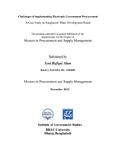Challenges of implementing electronic government procurement : a case study on Bangladesh water development board

View/Open
Date
2012-12Publisher
BRAC UniversityAuthor
Alam, Syed RafiqulMetadata
Show full item recordAbstract
Electronic Government Procurement (e-GP) solutions make purchasing activities more effective in terms of both time and cost. A large number of procurement articles have appeared in the literature in last 12 years. e-GP is changing the way businesses purchase goods, works and services. Since most products and services are procured using the Internet, the application of e-GP is inevitable in both manufacturing and services. There are limited empirical studies in the literature on the adoption of e-procurement in a country, that is, at the macro-level. Nevertheless, such a study will help companies in other countries to develop policies, strategies, and procedures to implement e-GP. Understanding the importance of such a study, I have conducted a questionnaire-based survey about the adoption of e-GP in Bangladesh Water Development Board (BWDB). The main objective of this study is to identify the perceived critical success factors and perceived barriers regarding the implementation of e-procurement. A conceptual framework has been developed for the adoption of e-GP, and this subsequently has been tested with data collected from BWDB. Also, this study examines the current status of e-GP adoption in BWDB. Finally, a framework is proposed based on the conceptual and empirical analysis for the adoption of e-GP. The results indicate that educating parties in both long- and short-term benefits would encourage the application of e-GP. Some critical success factors include adequate financial support, availability of interoperability and standards with traditional communication systems, top management support and commitment, understanding the priorities of the company, and having suitable security systems.
